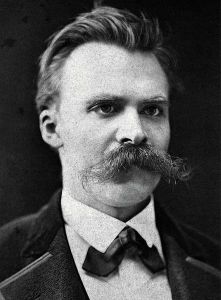Many seem to be wondering, if the media are to be believed, why America, like REM, is losing its religion. (And yes, I know that the expression for the latter means to lose one’s temper, not literally to lose one’s faith.) Derek Thompson at the Atlantic recently wrote about how the more literal loss took place around 1990. He posits that the rise of the Christian Right, the Cold War coming to an end, and 9/11 are behind the loss. As an historian of religion, even with a more ancient focus, I have to wonder if his gaze goes back far enough. Being born early in the sixties was an opportunity to have a front-row seat. My family was very religious. To us, the rest of the world may have been going to Hell, but locally we were trying to please God, as most everyone we knew was.
Theologians and sociologists thought God had died. Nietzsche, always ahead of his time, had declared as much nearly a century before the sixties got underway. The public face of religion, however, is never the same as what’s going on below. The religious right was built on a deep-seated hypocrisy from the beginning. Now hypocrisy is so very human it’d be easily forgiven were it not for the constant insistence on self-righteousness followed by the revelation of some base human vice. Time and time again televangelists didn’t cover the tracks of their peccadillos well enough, and Catholic priest couldn’t fight that feeling. They were doing what humans have probably always done, but while wearing the vestments of public respectability. Like Cthulhu, it seemed like God was dead but dreaming under the sea.
Religion, as all scholars of the phenomenon know, changes only very slowly. Church attendance began dropping in the seventies, but back then there was such a thing as the rule of law and a real concern that your neighbors didn’t think you a Commie. Fast forward to the era of Trump when the rule of law broke down completely and religions rank right up there with Republicans as being the most dishonest elements of humankind. We look back at when the slow trickle seemed to breech the dyke in the 1990s. The real game changer (since 9/11 was still in the future) was the birth of the internet. People began to talk freely about the two subjects—religion and politics—that those of us from the sixties were taught assiduously to avoid in polite company. Nietzsche published Die fröhliche Wissenschaft in 1882. It would take about a century to sink in, and human religious leaders would be the ones to prove his point. At least in this world of choosing our confessions.


3 thoughts on “The Happy Science”